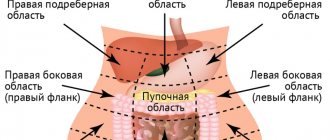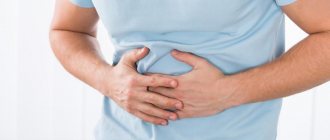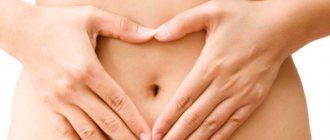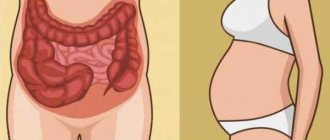The intestines, in which increased gas formation is observed, causes women great discomfort. Most often, the causes of bloating are problems in the gastrointestinal tract.
If you get rid of digestive disorders in a timely manner, then you will be able to forget about bloating. But it is worth considering the fact that gas formation can cause more serious problems in the body.
The causes of bloating in women and men are often the same. But there are still some differences.
Due to the fact that the body of the fair sex is structured a little differently, the factors that provoke bloating vary.
In order to understand why the problem arose and how to deal with it, you will have to make an appointment with a doctor who will prescribe the diagnosis and proper treatment.
Signs of flatulence
Bloating leads to the appearance of a large number of unpleasant symptoms that do not depend on the cause of flatulence. There are many factors leading to flatulence. The main signs of bloating include the following:
- Heaviness in the stomach.
- Feeling of abdominal distension and growth.
- Gas formation with unpleasant sounds.
- Long-term or short-term pain.
- Intestinal colic.
- Heartburn.
- Frequent hiccups.
- Nausea and belching.
When there is an excess of gas formation, compression of the internal organs occurs. It is this process that provokes painful sensations in the abdomen, which can be very acute.
It is worth considering that bloating is caused by both temporary causes and chronic diseases.
Women in late pregnancy also complain of flatulence. Their enlarged uterus puts pressure on their intestines, reducing intestinal tone, slowing down peristalsis and the movement of food masses.
Bloating during pregnancy
At the beginning of pregnancy, bloating is a typical phenomenon associated with physiological changes in the activity of the gastrointestinal tract. Therefore, it is not advisable to use pharmacological agents if increased gas formation does not bother the woman much.
Pregnancy is a provoking factor for the development of pancreatitis. With this disease, the stomach may swell and hurt, a feeling of fullness and heartburn may appear. Symptoms such as belching and diarrhea are also common. The level of progesterone in the blood of a pregnant woman increases, which leads to a decrease in muscle tone of internal organs. This leads to congestion in the pelvic area, resulting in bloating and a feeling of heaviness.
In any case, it is advisable to begin diagnostics to determine the cause of gas formation in a woman with a gynecological examination. Statistics show that bloating in the lower abdomen can be observed in the presence of an ovarian cyst. The patient has pain in the lower abdomen, bloating and bleeding.
An accurate diagnosis is established by a gynecologist after an external and internal examination, as well as based on data from laboratory tests and ultrasound. In certain cases, a biopsy or laparoscopy of a benign tumor is necessary. If there is a tumor in the appendages, the pain is localized on the left or right, depending on the location of the cyst.
Why does flatulence occur in girls?
Experts highlight several main points that can provoke gas formation in women. It is worth considering them in more detail.
Pathological factors
This includes reasons related to health problems. They are:
Diseases of the gastrointestinal tract
If a woman often experiences bloating even when she adheres to proper nutrition, then such symptoms indicate the presence of pathologies in the digestive system.
If flatulence appears in combination with painful sensations, it is recommended to visit a doctor, because the problems can be quite dangerous.
If the pain appears suddenly, is acute, and there is bleeding from the anus, you should urgently call an ambulance.
According to medical statistics, experts identify several main diseases that can cause bloating in women:
- gastritis and stomach ulcers. These two pathologies lead to significant disturbances in the digestive process: when food is broken down, volatile gases are produced.
- the presence in the body of the Helicobacter bacterium, which “lives” on the gastric mucosa. In this case, doctors need to rid the person of the bacteria, and digestion will improve.
- microflora disturbance. This pathology ranks second after gastritis and often leads to bloating.
- intestinal obstruction. The disease is considered dangerous and requires surgical intervention.
- inflammation of the appendix. This pathology is difficult to diagnose, because it can masquerade as “milder” diseases. And this must be done in a timely manner in order to avoid peritonitis.
- cholelithiasis. The presence of stones in the gall bladder can cause flatulence in women. In addition to bloating, the symptoms of the pathology are as follows: pain in the back and abdomen, nausea, vomiting.
- allergic reaction. In this case, we are talking about problems in the immune system that affect the entire body.
Frequent depression and stressful situations. Such phenomena can cause not only tension, but also weakening of the intestines.
Pathological causes
Persistent flatulence over a long period is a reason to consult a doctor. If bloating occurs systematically, this may indicate gastrointestinal diseases. Symptoms of gas formation are observed with gastritis, cholecystitis, pancreatitis, and intestinal inflammation. Often the culprit of the disease is the harmful bacteria Helicobacter pilory.
The list of other pathologies when a woman has blowing and stomach pain is extensive:
- dysbacteriosis;
- infectious intestinal diseases;
- the presence of worms;
- inflammation of the appendix;
- urinary tract infections;
- growth of tumors;
- intestinal obstruction;
- inflammation of the genital organs.
Less commonly, bloating can be caused by neurosis. Irritable bowel syndrome is associated with stress, emotional stress, and conflicts. After eating, gases accumulate, and the condition worsens during the day. In the evening, the stomach feels tight and hurts, and cramps appear. The disorder can occur even in completely balanced people.
Hormonal reasons
Such pathological conditions appear only in the fair sex. This may include the following phenomena:
- pregnancy. This is a natural reason that causes nausea and bloating in a lady. This is explained by hormonal changes in the body of the expectant mother and the fact that the growth of the uterus leads to compression of the internal organs, disrupting their functionality.
- menstruation. A large number of women have experienced bloating during their menstrual periods. The fact is that cyclical changes lead to a slowdown in water metabolism in the body. A few days before the onset of menstruation, blood begins to circulate more actively around the pelvis, which provokes compression of nearby organs.
- menopause. When women enter menopause, their hormonal levels change completely. At this time, the woman experiences many unpleasant symptoms, and bloating is possible.
In the case where flatulence is caused by any of the described pathologies, its symptoms will disappear immediately when the underlying disease is cured.
The most important thing is to contact specialists in a timely manner to make an accurate diagnosis.
Bloating during menopause
During menopause, as well as during pregnancy, increased gas formation may occur, the causes of which are the hormonal imbalance that accompanies menopause. In mature patients, body weight and abdominal volume often increase, and this is also one of the reasons for the occurrence of flatulence.
The main causes of bloating and discomfort in women during menopause:
- deterioration of intestinal permeability;
- hormonal imbalance;
- water retention in the body, which can cause the lower abdomen to swell.
With the onset of menopause, sometimes the lower abdomen feels tight. This phenomenon most often occurs after eating food or at night. Bloating in women during menopause occurs due to poor diet, overeating, abuse of carbonated drinks and coffee, as well as due to common diseases such as diabetes and IBS.
Treatment for increased gas formation during menopause depends on the cause of the pathology. It consists of prescribing prokinetics that improve intestinal motility and dietary nutrition.
During menopause, a woman becomes very vulnerable; hormonal changes in the body occur, which affects the functioning of all body systems. Against this background, bloating and pain in the lower abdomen may occur.
Non-pathological factors
Here we are talking about reasons that are not related to health. They are:
- Having bad habits.
As everyone knows, tobacco negatively affects not only the lungs, but also the gastrointestinal tract. Smoking leads to the fact that a large amount of harmful substances penetrates into the body, which it tries in every possible way to get rid of. Smoke provokes problems with blood circulation and causes excess stomach acid. All these phenomena are considered causes of bloating in women. - Wrong nutrition. Most often, women suffer from flatulence due to eating the wrong foods. This includes individual products and daily meals.
If we talk about specific products, milk often leads to bloating. This is explained by the fact that the human body often does not have enough certain enzymes to break down milk, which provokes flatulence.In addition to dairy products, women can experience bloating after eating vegetables, canned food, carbonated water, bran, whole grain bread, sweeteners and legumes.
This also includes fruits consumed after meals. Due to the fact that fruits are digested very quickly, they lead to a fermentation process. Experts advise eating fruit either before meals or some time after.
- Incorrect eating process. It's not just the food you eat that can cause bloating, but also the way you eat it.
If a woman swallows food quickly and chews it poorly, then she swallows a lot of excess air, which enters the stomach.
Air flows into the digestion process and moves through the intestines, “swelling” it.
Sometimes gas formation can be caused by chewing gum or reheating food several times.
Pensioners! Don't cut fungal nails! They appear instantly: take the Soviet, thick...
If the pressure is above 130/90, the blood vessels need to be cleaned. The easiest way: drink a decoction of
Due to the fact that the heating process changes the molecular composition of the food, it is digested differently than fresh food.
This huge list of reasons can be continued for a long time. This suggests that the woman herself is not able to determine the exact cause of the problem, so she must trust the specialists.
Only a doctor, after conducting a proper examination and taking the necessary tests, will be able to make the correct diagnosis and prescribe adequate treatment.
Causes of bloating
Flatulence can be caused by various factors, namely:
- parasitic diseases;
- errors in nutrition;
- dysbacteriosis;
- intestinal infections;
- diseases of the digestive tract;
- weakened immune system;
- neoplasms;
- chronic constipation;
- hormonal imbalance;
- bad habits: smoking, alcoholism;
- overeating and talking while eating;
- intolerance to certain foods.
In addition, pregnancy, menopause, menstrual irregularities, gynecological disorders, and premenstrual syndrome can trigger bloating in the lower abdomen.
Poor nutrition is a common cause of flatulence
Separately, it is worth noting the most common cause of flatulence is unhealthy diet. For many modern girls, it is extremely important to build a career, which makes it difficult to keep track of nutrition.
Increased gas formation may be associated with frequent consumption of milk. The stomach does not have enough enzymes necessary to digest the product. Gas-forming products also include foods that contain yeast, coarse fiber, lactose, and carbons.
Let's look at the list of products that contribute to flatulence:
- legumes;
- White cabbage;
- raw vegetables and fruits;
- fresh bakery;
- kvass, beer;
- sweet soda.
Features of patient examination
During intestinal spasms, the process of natural release of gases is disrupted, which leads to an enlarged abdomen and flatulence.
When a woman goes to a medical facility, the doctor sends her for examination.
The standard examination scheme consists of the following procedures:
- Examination of the patient. The doctor conducts a visual examination and palpation of the abdomen, listens to the intestines for the presence of bowel sounds.
- Taking a blood test, which makes it possible to check the level of red blood cells, white blood cells and hemoglobin.
- Urinalysis to identify pathologies of the genitourinary system.
- Blood sugar test.
- Analysis of feces for elastase, during which pathologies of the pancreas are confirmed or refuted.
- Carrying out a coprogram to detect mucus or blood in the stool.
- Stool culture for bacteria.
But the most effective examination method can be called a survey radiography of the abdominal organs. Thanks to the procedure, doctors diagnose dangerous diseases such as pneumatosis or intestinal obstruction.
Causes of persistent flatulence
The causes of flatulence often lie in gastrointestinal diseases. Among such intestinal pathologies that cause bloating are: prolonged stress, diarrhea, dysbacteriosis, pancreatitis and helminthiasis. At the same time, the increased gas formation is sustainable.
In women, a symptom such as bloating may well indicate a gynecological disease. Discomfort in the abdomen and flatulence can accompany menstrual bleeding, the nature of the pain is pulling.
How to treat pathology
The doctor, who takes into account the symptoms and examination results, prescribes treatment to the patient using drugs that help the gases pass and the digestive system to recover.
If a woman has only bloating and slight pain, then she can take Papaverine or No-Shpu. The drugs will eliminate pain and reduce the production of gas.
When a woman suffers from bloating accompanied by constipation, she is recommended to take Forlax, a powder that stimulates the intestinal muscles.
Another option is Duphalac, which comes in the form of a syrup-like liquid.
If there is an infectious process, patients are prescribed antibacterial drugs. These include Rifaximin or Furazolidone. It is worth considering that the drugs should not be taken for longer than 7 days, so as not to harm the body.
After the course of treatment is completed, the woman needs to drink probiotics, which restore the microflora in the intestines.
When diagnosing neoplasms of various types, patients require surgical intervention and more thorough examination in specialized institutions.
It must be remembered that self-medication in this case can be life-threatening.
Prevention
If bloating in women is not associated with serious pathologies of the body, the recipe is simple. You need to establish a proper diet. Eating 5-6 times a day eliminates both the feeling of hunger and overeating. In a short period of time, a woman does not have time to get hungry; a dish weighing 250 g does not stretch the stomach or cause a feeling of heaviness.
Sufficient physical activity, compliance with the drinking regime, giving up smoking and alcohol - by fulfilling these conditions, you can reduce the risk of developing flatulence. If these methods are not effective, you need to look for other reasons for the failure. Diagnosis is possible only with the involvement of a doctor; self-medication is unacceptable.
Doctors distinguish natural and pathological causes of lower abdominal pain and bloating in women. To determine the source of the malaise, additional symptoms that arise should be analyzed and, if necessary, undergo examination.
Traditional medicine recipes
For a woman who suffers from bloating, doctors can prescribe a large number of medications.
But in the absence of dangerous pathologies and serious diseases, the patient can resort to traditional medicine recipes.
Healers claim that these are the infusions and decoctions that will help cope with flatulence:
- Tincture of dill water. You need to take 1 tablespoon of dill seeds and 0.5 liters of boiling water, leave the seeds in a glass container for 3 hours. Take 150 grams 3 times a day before meals.
- A decoction of dill water. Take 1 tablespoon of dill seeds and 200 milliliters of water at room temperature. Pour in the seeds, put on the fire and simmer after boiling for about 20 minutes. Allow the liquid to cool and filter through cheesecloth. Drink 200 milliliters 2 times a day before meals.
- Parsley root. Grind the root to 1 teaspoon, pour it with 1 glass of water and leave for 30 minutes. After this, the broth is placed on the fire and heated, but not brought to a boil. Strain and drink warm every hour.
- Tincture of thyme and dill.
Take a teaspoon of dill seed, 1 teaspoon of dried thyme and 250 milliliters of boiling water, mix everything and leave under a lid and a towel for about 15 minutes. Then they put it on the fire, boil and filter. It is recommended to take 40 milliliters of this remedy for bloating every hour. - Using dandelion. You need to take 2 tablespoons of dandelion root and 250 milliliters of water, mix and leave for 24 hours, wrapped in a warm thing. Strain the finished product and drink about 5 times a day, 35 - 50 milliliters.
- Collection of herbs.
Healers prepare 2 tablespoons of mint, 1 tablespoon of fennel, 1 tablespoon of valerian. Mix the ingredients thoroughly and place in a jar tightly closed with a lid. To prepare the infusion, take 2 teaspoons of a mixture of herbs from a jar, pour boiling water over them and leave for 30 minutes. Strain and drink 2 times a day. - Healing chamomile. You will need a glass of water, 1 tablespoon of chamomile from the pharmacy. Pour water over chamomile, boil for 5 minutes and leave for a while to infuse. Treatment of bloating is carried out by taking 1 tablespoon 15 minutes before meals.
We must not forget that traditional medicine should not replace taking medications. Decoctions and infusions only complement the basic therapy prescribed by the attending physician.
How to get rid of bloating?
Depending on the root cause of gas formation, consultation with a gastroenterologist, neurologist, therapist, oncologist, or infectious disease specialist may be required. If you have problems with your digestive tract, it is extremely important to eliminate foods that can cause fermentation.
First of all, you need to adjust your diet
If bloating is not accompanied by any additional symptoms, your doctor may prescribe the following medications:
- Motilium. The product will eliminate flatulence and improve digestive processes.
- For better digestion of food, enzymatic agents are used.
- Bifiform is prescribed to regulate the balance of intestinal microflora.
- Chamomile and dill decoction.
- In case of intoxication, the use of Enterosgel will be required.
- You may need to use a laxative tablet as a cleanser.
Non-traditional recipes can be used as an addition to the main treatment:
- Field chamomile. The dry product is poured with boiling water and infused. Once the solution has been filtered, it is ready for use. Take a tablespoon five times a day. Chamomile infusion wonderfully calms the nervous system.
- Ginger. The powder can be added to prepared dishes. Ginger root can be put in a cup of tea. Chopped pieces of ginger are poured with boiling water and infused. Then take one tablespoon at a time.
- Potato. The vegetable is peeled and passed through a juicer. Freshly squeezed juice is taken on an empty stomach.
- Make a tea based on peppermint or lemon balm. It will calm the nervous system well and eliminate bloating.
Diet for flatulence
A diet against bloating is prescribed to alleviate the patient’s condition, but does not relieve her of the main cause of flatulence. The principle of the diet is measured and regular nutrition.
The diet is based on five meals a day and observing the compatibility of foods eaten. Experts prohibit mixing carbohydrates with proteins, or mixed foods with sweets.
You cannot eat processed foods, chips, sausage, hamburgers and bouillon cubes. It is forbidden to snack between main meals. If a woman is very hungry, she can drink some water.
Food should be chewed well, not swallowed whole, and take your time. This is explained by the fact that food that has been processed by saliva will be digested faster in the stomach.
There is no need to eat cold or too warm foods.
The woman will have to give up drinks and water with gases. In addition, you should not eat spicy, fatty or fried foods. It is better to cook dishes in a double boiler.
Causes of pain in the lower abdomen
The feeling of bloating in the stomach is always unpleasant. But why does this happen? The reasons vary. There are physiological causes, short-term and rarely recurring. And there are serious ones, when the discomfort is caused by problems with internal organs
Physiological state
The natural state of the body during digestion of food. During the digestion process, beneficial substances and gases are released. Each food product contains a certain amount of modified air, which is released as the food is processed. Observations show: the more fiber in a product, the more gases are released in the digestive tract. If you reduce the amount of bread, legumes or cabbage in the menu, the digestion process will be quieter.
Unpleasant sensations are caused by intolerable foods. The body cannot digest them. Smoking and drinking alcoholic beverages disrupts the natural processes in the body, a malfunction of the internal organs occurs, gases accumulate in the intestines and put pressure on the walls, which causes pain not only in the lower abdomen. The pain can radiate to the lower back and hypochondrium.
Among women
Representatives of the fair half of humanity have more reasons for stomach pain and bloating than men. This is due to the structural features of the female body.
- Pain can occur due to disruption of the menstrual cycle or becomes a natural accompaniment of menstrual flow. Girls often experience painful periods.
- Pregnancy or ectopic pregnancy. Pain occurs due to pressure from the fetus on the digestive organs. A woman feels pain below, discharge appears from the vagina - this is a sign that it’s time to see a doctor.
- Climax. In women, age is associated with pain not only in the abdomen, but also in the lower back. This is associated with significant changes occurring in the female body and suppression of reproductive function.
- Diseases of the female genital organs in a progressive stage.
- Uterine fibroids and endometriosis.
Endometriosis of the uterus
In children
Infants are especially susceptible to bloating. Their digestive system is not strong enough to cope with harmful bacteria. An incorrectly selected mixture causes increased gas formation due to the inability to digest the substances. And on breast milk, a baby can suffer from gas emissions. Then the mother needs to reconsider her diet and remove the product that causes bloating.
Older children suffer from flatulence from an unbalanced diet and addiction to sweets, snacks between meals, and carbonated drinks.
Measures to prevent flatulence
In addition to following a diet and timely treatment of gastrointestinal pathologies, a woman should take into account several recommendations on how to prevent bloating in the future.
- Regular physical activity and a healthy lifestyle guarantee that treatment will not be required. Sport strengthens the body and normalizes the functioning of all its functions.
- Frequent exposure to fresh air.
- Proper nutrition throughout life.
In the case where it was not possible to avoid the disease and there are reasons for this, it is recommended not to hesitate to visit a qualified specialist to make a final diagnosis.
After the causes of the formation have been identified and the pathology has been treated, the woman must strictly follow the instructions and prescriptions of the attending physician.
If you do not adhere to these recommendations, a rapid relapse of the disease is possible.
Diseases accompanied by bloating
There are many diseases whose symptom is bloating. SDRK is characterized by hypersensitivity to food products, expressed in spasms that disrupt the transport of feces. This leads to chronic constipation, which causes pressure on the intestinal wall and stretches it. Hence the flatulence and pain in the left side of the lower abdomen with swelling of the sigmoid colon.
The main diseases accompanied by bloating:
- blockage of the urinary tract;
- appendicitis (usually severe abdominal pain on the right side);
- stones in the gallbladder;
- intestinal obstruction;
- diverticulitis.
Treatment of flatulence in each of these cases should begin with treatment of the underlying disease, in some cases with surgical intervention.
Thus, diseases of the gastrointestinal tract in most cases are accompanied by increased gas formation and bloating. If these unpleasant symptoms occur rarely and for a short time, then it is quite possible to use herbal medicine without using pharmacological agents. But if bloating is accompanied by acute pain, fever, general deterioration in health, loss of appetite, weakness and dizziness, then you should not hesitate to visit a doctor, since abdominal swelling is characteristic of many surgical diseases of the gastrointestinal tract.
Diseases that stimulate the appearance of symptoms
Low or high levels of gases in the body is a problem that can be directly related to a threat to human life.
gastritis
cholelithiasis
The fact is that many serious diseases begin to manifest themselves in the form of bloating. Here are just a few of them:
- gastritis very often gives rise to a similar symptom;
- the vital activity of the dangerous bacterium Helicobacter pylori affects the development of increased gas formation;
- microflora disturbance;
- cholelithiasis;
- problems with bloating may be the first alarming symptom of the development of benign and malignant tumors;
- inflammation of the appendix may well cause a problem.
The list of serious diseases, among the symptoms of which bloating can be found, is quite long. That is why the problem should not be ignored, because the sooner a person starts treatment, the easier it will be to cope.
Do you still think that healing your stomach and intestines is difficult?
Judging by the fact that you are now reading these lines, victory in the fight against diseases of the gastrointestinal tract is not yet on your side...
Have you already thought about surgery? This is understandable, because the stomach is a very important organ, and its proper functioning is the key to health and well-being. Frequent abdominal pain, heartburn, bloating, belching, nausea, bowel dysfunction... All these symptoms are familiar to you firsthand.
But perhaps it would be more correct to treat not the effect, but the cause? Here is the story of Galina Savina, about how she got rid of all these unpleasant symptoms... Read the article >>>
Bloating in women is a common problem, indicating a number of pathologies developing in the body. Often, bloating occurs due to natural causes, but one should never discount dangerous diseases that stimulate the unpleasant symptom.
Symptoms of bloating
For many women, problems with gas elimination are standard, because they appear regularly and do not disappear over time. However, we should not forget that when the abdomen is distended, gases begin to have a negative effect on the functioning of organs located nearby. As a result, the number of anxiety symptoms increases. Among them are usually distinguished:
abdominal pain; heaviness in the abdomen, a feeling of fullness due to the presence of a large amount of gas; loss of appetite, often nausea or even vomiting; almost always the problem is accompanied by characteristic seething and unpleasant sounds; against the background of the problem, gynecological inflammation may also develop.
Most often, bloating is accompanied by a feeling of pain and lack of appetite. Unpleasant sensations do not leave the lady even after going to the toilet or long-term abstinence from eating. Pain and heaviness are among the main symptoms.
Secondary are those symptoms that arise due to a negative effect on internal organs. Women most often experience inflammatory processes in the female organs, especially if the problem develops over several months.
In no case should you ignore alarming symptoms, because then they will not disappear and will develop into a much more dangerous and serious form.
What causes stimulation of increased gas formation during nutritional disorders?
As we age, our stomach does not produce the required amount of enzymes involved in the breakdown of milk proteins. Due to this factor, gases are formed.
Bran and other whole grains develop the same problems. Our favorite candies, cookies, muffins, ice cream, carbonated drinks, sugar, and chewing gum help stimulate the production of gases.
Symptoms that arise from bloating and pain are a consequence of eating disorders, constant nervous and stressful experiences.
As a result, after this new problems appear in the form of gastritis, stomach ulcers, gastroduodenitis. The intestines will also not be left without “attention”; constipation, ulcers, and excess gases may develop in it.
Constipation contributes to fermentation and increased gas formation. These processes are the causes of frequent bloating in the abdominal area.
If you ignore and do not seek help from a specialist, a number of such diseases will appear over time:
- stagnation in the bile area;
- gastritis;
- enlargement in the area of the liver and pancreas;
- pancreatitis.
Bloating, a feeling of pain, and heaviness can be caused by reheated food, snacks on the go, rapid absorption of food, and talking while eating.
During a conversation while eating food, gases form due to swallowed air.
With a tendency to overeat, women often suffer from bloating. This problem can be solved by trying to limit the amount of food you eat.











